Year-End Financial Checklist
Every suggestion may not apply to your situation, but they offer some ideas to explore. After all, you don’t want to waste money, incur penalties, or pay more taxes than you have to.
Review Your Portfolio Strategy
Are you reaching a milestone in your life, such as retirement or a change in your circumstances? Has your tolerance for taking risks changed? If so, set up a meeting with your Hilltop Wealth Advisor and adjust your financial plan.
When stocks tumble, some investors become very anxious. Conversely, when stocks post strong returns, others feel invincible and are ready to load up on riskier assets.
Remember, the financial plan is your roadmap to your financial goals. It is designed to remove the emotional component that may encourage you to buy or sell at inopportune times. In other words, be careful about making portfolio decisions based solely on market action.
Long-term academic data and our own experience tell us that the shortest distance between an investor and their financial goals is adherence to a well-diversified holistic financial plan.
Take Stock of Life Changes
Are you expecting any major life events within the next year, such as a wedding or an extensive medical procedure on the horizon?
Whatever your financial situation, when it comes to paying for large expenses, try and do so without hurting your finances.
Take on new debt only if you can fit the monthly payments into your budget. If the past couple of years has taught us anything, it’s to expect the unexpected, so remember to factor in an emergency savings plan for unforeseen costs that may come up.
Also, note the tax loss deadline. You have until December 31 to harvest any tax losses or offset any capital gains.
It may be advantageous to time sales to maximize tax benefits this year or next. Also, you may want to book gains and offset any losses.
But be aware that short- and long-term capital gains are taxed at different rates. And don’t run up against the wash-sale rule (see IRS Publication 550), which could disallow a capital loss. (A wash sale occurs when you sell a security at a loss and then purchase that same security or “substantially identical” securities within 30 days, before or after the sale date.)
Also, did you know that you pay no federal taxes on a long-term capital gain if you reside in the 10 percent or 12 percent federal income tax bracket? In other words, you may sell your stock, take the profit, and pay no federal income tax.
But be careful here too. The sale will raise your adjusted gross income, which means you’ll probably pay state income tax on the long-term gain.
By raising your AGI, you could also impact various tax deductions or receive a smaller ACA premium tax credit if you obtain your health insurance from the Marketplace.
Review Your Insurance Policies
Life has been full of uncertainties recently, which means ensuring that you’re protected is more important than ever.
Review any existing policies you or your family have, especially life insurance, homeowner’s or renter’s insurance, car insurance, and health insurance. Ask yourself a few questions: Do you need more or less insurance in the coming year? What changes might you need to make?
Going through each of your policies will help you feel a bit more prepared, just in case.
Double-check your designated beneficiaries
When you apply for a life insurance policy, 401(k), IRA, and even some non-retirement accounts, you will be asked to name one or more beneficiaries.
This can make a huge difference to your estate planning because many people don’t realize that a will does not control who receives all of their assets when they pass away.
So not naming beneficiaries when you’re asked to could mean your money gets tied up in probate for months or years. Know the critical mistakes to avoid when naming beneficiaries.
Mutual Funds and Taxable Distributions
This is best described using an example. If you buy a mutual fund on December 15 and it pays its annual dividend and capital gain on December 20, you will be responsible for paying taxes on the entire yearly distribution — even though you held the fund for just five days.
It’s a tax sting that’s best avoided because the net asset value hasn’t changed. Therefore, it’s usually a good idea to wait until after the annual distribution to make the purchase.
Required Minimum Distributions
The SECURE Act made major changes to RMD rules. If you reach age 70½ in 2020 or later, you must take your first RMD by April 1 of the year after you reach 72.
If you reached the age of 70½ in 2019, the prior rule applies.
For all subsequent years, including the year in which you were paid the first RMD by April 1, you must take the RMD by December 31. Don’t miss the deadline, or you could be subject to a steep penalty!
While delaying the RMD until April 1 can cut your tax bite in the current year, please be aware that you’ll have two RMDs in the following year, which could bump you into a higher tax bracket.
The RMD rules apply to all employer-sponsored retirement plans, including profit-sharing plans, 401(k) plans, 403(b) plans, and 457(b) plans.
The RMD rules also apply to traditional IRAs and IRA-based plans such as SEPs, SARSEPs, and SIMPLE IRAs. (RMD rules do not apply to Roth IRAs.)
Contribute to a Roth IRA or Traditional IRA
A Roth gives you the potential to earn tax-free growth (not just deferred tax-free growth) and allows for federal-tax-free withdrawals if specific requirements are met.
You may also be eligible to contribute to a traditional IRA. And contributions may be fully or partially deductible, depending on your income and circumstances. However, total contributions for both accounts cannot exceed the prescribed limit.
You can contribute if you — or your spouse- filing jointly — have taxable compensation. As of 2020, there is no age limit on making regular contributions to traditional or Roth IRAs.
And you can make 2021 IRA contributions until April 15, 2022.
Charitable Giving
Whether cash, stocks, or bonds, you can donate to your favorite charity by December 31, potentially offsetting any income.
Also, you may qualify for what’s called a qualified charitable distribution (QCD) if you are 70½ or older.
A QCD is an otherwise taxable distribution from an IRA or inherited IRA that is paid directly from the IRA to a qualified charity.
A QCD may be counted toward your RMD up to $100,000. You and your spouse can make a $100,000 QCD from your IRAs if you file jointly. This becomes even more valuable in light of tax reform as the higher standard deduction may preclude you from itemizing.
You might also consider a donor-advised fund. Once the donation is made, you can generally realize immediate tax benefits, but it is up to the donor when the distribution to a qualified charity may be made.
Every new year presents a fresh, new beginning. Whatever your financial goals are, write them down, create some milestones, and think positive — you’ll feel more in control of your money and life.
I trust you’ve found these planning tips to be helpful. As a reminder, we are always here to assist. Please feel free to contact your Hilltop Wealth Advisor if you have any questions or concerns.
Disclaimer
This article was prepared by Horsesmouth, LLC, and does not necessarily represent the views of the presenting party, nor their affiliates. This information has been derived from sources believed to be accurate. Please note — investing involves risk, and past performance is no guarantee of future results. The publisher is not engaged in rendering legal, accounting, or other professional services. If assistance is needed, the reader is advised to engage the services of a competent professional. This information should not be construed as investment, tax, or legal advice and may not be relied on for the purpose of avoiding any Federal tax penalty. This is neither a solicitation nor recommendation to purchase or sell any investment or insurance product or service and should not be relied upon as such.


